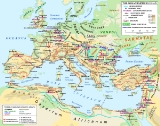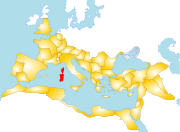
Corsica et Sardinia
Encyclopedia

Roman Empire
The Roman Empire was the post-Republican period of the ancient Roman civilization, characterised by an autocratic form of government and large territorial holdings in Europe and around the Mediterranean....
province including the islands of Corsica
Corsica
Corsica is an island in the Mediterranean Sea. It is located west of Italy, southeast of the French mainland, and north of the island of Sardinia....
and Sardinia
Sardinia
Sardinia is the second-largest island in the Mediterranean Sea . It is an autonomous region of Italy, and the nearest land masses are the French island of Corsica, the Italian Peninsula, Sicily, Tunisia and the Spanish Balearic Islands.The name Sardinia is from the pre-Roman noun *sard[],...
.
Pre-Roman times
The PhoeniciaPhoenicia
Phoenicia , was an ancient civilization in Canaan which covered most of the western, coastal part of the Fertile Crescent. Several major Phoenician cities were built on the coastline of the Mediterranean. It was an enterprising maritime trading culture that spread across the Mediterranean from 1550...
ns were the first to establish several commercial stations in Corsica and in Sardinia. After the Phoenicians, there arrived the Greeks, who also established their colonies. The Carthaginians
Carthage
Carthage , implying it was a 'new Tyre') is a major urban centre that has existed for nearly 3,000 years on the Gulf of Tunis, developing from a Phoenician colony of the 1st millennium BC...
, with the help of the Etruscans
Etruscan civilization
Etruscan civilization is the modern English name given to a civilization of ancient Italy in the area corresponding roughly to Tuscany. The ancient Romans called its creators the Tusci or Etrusci...
, conquered the Phoenicians in Alalia
Aléria
Aléria is a commune in the Haute-Corse department of France on the island of Corsica...
, a colony on Corsica, in 535 BC. After Corsica, Sardinia also came under control of the Carthaginians.
Obtaining the province
Even though Rome had drawn up an earlier treaty with Carthage, a complete disregard to this agreement led them to forcibly annex Corsica and Sardinia during the First Punic WarFirst Punic War
The First Punic War was the first of three wars fought between Ancient Carthage and the Roman Republic. For 23 years, the two powers struggled for supremacy in the western Mediterranean Sea, primarily on the Mediterranean island of Sicily and its surrounding waters but also to a lesser extent in...
. In 238 BC, the Carthaginians, accepting defeat in the First Punic War, surrendered Corsica and Sardinia, which together became a province of Rome. This marked the beginning of Roman domination in the Western Mediterranean. The Romans ruled this area for 694 years.
Roman opinion of the province
Throughout this rule, Rome maintained an objective relationship with the province. The coastal regions of both islands were settled by Romans and adopted the Latin language and culture. However, the interior areas of Corsica and Sardinia resisted the Romans. A variety of revolts and uprisings occurred. However, since the interior areas were densely forested, the Romans avoided them and set them aside as the “land of the barbarians”.Overall, Corsica and Sardinia became trivial gains compared to the Roman Empire’s Eastern gains. From Sardinia, the Romans did not receive much spoil nor were the prisoners willing to learn anything Roman. A similar situation occurred in Corsica. It was said that “whoever has bought one [Corsican] regrets the waste of his money”. The Romans regarded the land and people as backward and unhealthy.
Relationship to Rome
Even though the Romans considered them trivial, Corsica and Sardinia ended up playing an important role in the happenings of the Empire. Sardinia provided much of the grain supply during the time of the Roman Republic. Corsica provided wax to the empire, as that was all that could be found on the island.The islands also indirectly contributed to the demise of the Roman Republic. Gaius Marius
Gaius Marius
Gaius Marius was a Roman general and statesman. He was elected consul an unprecedented seven times during his career. He was also noted for his dramatic reforms of Roman armies, authorizing recruitment of landless citizens, eliminating the manipular military formations, and reorganizing the...
and Lucius Lucius Cornelius Sulla Felix settled their veterans on Corsica and used the islands' grain supply to support their war efforts. Julius Caesar had Sardinia occupied by his delegates and gained control of the grain supply. This supply of grain fed his army and ensured their victory in the civil war
Caesar's civil war
The Great Roman Civil War , also known as Caesar's Civil War, was one of the last politico-military conflicts in the Roman Republic before the establishment of the Roman Empire...
of 49 BC. Within the second triumvirate, Octavian received the islands as part of his share and used its grain supply to feed his armies against Brutus and Cassius.
Corsica and Sardinia also came to be recognized as a place of exile. C. Cassius Longinus, the lawyer accused of conspiracy by Nero
Nero
Nero , was Roman Emperor from 54 to 68, and the last in the Julio-Claudian dynasty. Nero was adopted by his great-uncle Claudius to become his heir and successor, and succeeded to the throne in 54 following Claudius' death....
was sent to the province as was Anicentus, murderer of the first Agrippina
Agrippina
Agrippina may refer to:In people:* Vipsania Agrippina , daughter of Caecilia Attica and first wife of the Emperor Tiberius* Vipsania Marcella Agrippina , daughter of Claudia Marcella Major and first wife of general Publius Quinctilius Varus* Julia the Younger or Vipsania Julia Agrippina , daughter...
. Many Jews and Christians were also sent to the islands under Tiberius
Tiberius
Tiberius , was Roman Emperor from 14 AD to 37 AD. Tiberius was by birth a Claudian, son of Tiberius Claudius Nero and Livia Drusilla. His mother divorced Nero and married Augustus in 39 BC, making him a step-son of Octavian...
.

